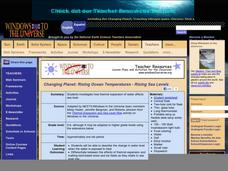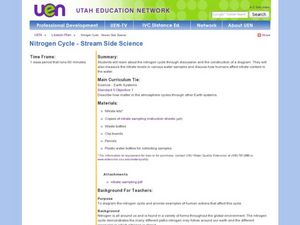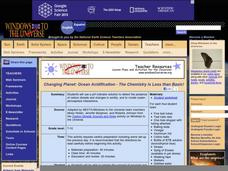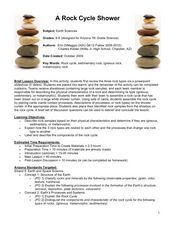Science 4 Inquiry
Layers of the Earth
We can't dig a hole through the Earth, so how do we know about the layers beneath our feet? Scholars learn about layering through hands-on exploration of common materials. They study the characteristics of each layer and apply their...
National Science Teacher Association
Middle School Sampler: Science
Focus on inquiry-based learning in your science class with a series of activities designed for middle schoolers. A helpful packet samples four different texts, which include activities about predator-prey relationships, Earth's axis and...
Science 4 Inquiry
Journey Through the Spheres of the Earth
Each of the Earth's spheres interacts with the other spheres in predictable ways. Young scientists explore these interactions through a hands-on activity, graphing, and watching a video. They summarize their knowledge in a video or...
PHET
The Earth as a Magnet
Everyone loves playing with magnets and iron filings. Here, young scientists first observe and then participate in an activity demonstrating magnetic fields. After completing their observations, they apply this knowledge to...
NASA
Earth and Space—Climate and Seasons
Why does Earth have so many seasons? Learn about the importance and changes of our planet's climate with a series of learning activities, which focus on connecting seasons to past experiences, making scientific observations, and...
NASA
Rain Gauge Activity
Complete teacher narrative and presentation slides for teaching about Earth's water make up the bulk of this lesson. Embedded within the slide show, you will find videos about the water cycle, keeping track of the limited supply of fresh...
Curated OER
Changing Planet: Rising Ocean Temperatures - Rising Sea Levels
As an anticipatory set, young environmental technicians watch a video about how ocean temperatures seem to be changing along with the global climate. They perform a laboratory demonstration with the purpose of observing what happens to...
Center Science Education
Looking Into Surface Albedo
How does the color of a surface affect the heating of the earth? Middle school science classes experiment with color and surface albedo to determine the relationship. The website has tabs for an overview, teacher's instructions,...
Curated OER
Changing Planet: Black Carbon - a Dusty Situation
Introduce your young meteorologists to black carbon produced by the burning of fossil fuels by showing the video, "Changing Planet: Black Carbon." Viewers discover that deposition of this carbon on polar ice impacts the absorption of...
University of Colorado
Is There Life on Earth?
To find life on another planet, scientists look for gases (atmosphere), water, and temperatures that are not extreme. In this activity, groups of pupils become "Titan-ians," scientists who want to explore Earth for possible life forms....
Curated OER
Nitrogen Cycle-Stream Side Science
A thorough background and nitrate sampling lab sheet are provided to share with your young scientists. After discussing the nitrogen cycle with the class, you will break them into small groups and show them how to use their inquiry...
Science 4 Inquiry
Atmospheric Layers
Space diving refers to the act of jumping from outer space and falling through Earth's atmosphere before parachuting to land. Scholars learn about this extreme activity and study the layers of the atmosphere they must conquer in the...
Curated OER
Changing Planet: Permafrost Gas Leak
Pair earth scientists up to use an amazing online arctic portal mapping tool and Google Earth to analyze permafrost changes. They compare changes to data on atmospheric concentrations of methane to see if there is a correlation. Then...
Curated OER
Changing Planet: Sea Levels Rising
Begin by showing a six-minute video, Changing Planet: Rising Sea Level as an anticipatory set. Pupils draw a topographic map of a potato continent. Finally, they will visit NOAA's sea levels online map and NASA's carbon dioxide...
Curated OER
Changing Planet: Ocean Acidification - the Chemistry is Less than Basic!
A video and laboratory investigation are highlights to this lesson on acidification of ocean water due to increased atmospheric carbon dioxide. Using bromothymol blue (BTB) as an indicator, pupils analyze the amount of carbon dioxide...
US Environmental Protection Agency
Weather and Climate: What's the Difference?
Future weather forecasters collect daily temperatures over a period of time. Afterward, they compare their data with monthly averages, as researched on national weather websites, in order to grasp the difference between weather and...
Astronomical Society of the Pacific
Getting Ready for the All American Eclipse!
Give your pupils a front row seat at the biggest light show in the sky this year! In addition to admiring the total solar eclipse, young astronomers can explain the phenomenon with a little help from an inquiry-based instructional...
Science 4 Inquiry
The Impact of the Sun and Moon on Tides
In 150 BC, Seleucus of Seleucia theorized that the moon causes the tides. Scholars learn about what causes tides by studying the interactions of gravity between the sun, moon, and Earth. They use technology to formalize otherwise...
Texas State University
Earth: Deposition and Lithification
Geology geniuses analyze sediment samples with a hand lens and sort according to physical characteristics. They also learn about the processes of cementation, compaction, and lithification within the rock cycle. The lesson plan is...
Curated OER
A Rock Cycle Shower
Students classify rocks as sedimentary, igneous or metamorphic based on physical properties. In this earth science lesson, students recreate the rock cycle using a set of stones placed on labeled shower curtain. They explain the...
EduGAINs
Go H2O! Investigating Residential Water Systems
Before your learners excuse themselves to get a drink at the water fountain, prompt them to think about where that water comes from. A middle school science instructional activity encourages groups to research their community's source of...
Journey Through the Universe
How Far is Far?
The earth only revolves around one thing — and it's not any of your pupils. The lesson includes two activities dealing with the distance to the sun and the moon. First, scholars create a pin hole camera and use the rules of similar...
Earth Day Network
Filtering Water
See the water filtration system up close with a fun science experiment. Young scientists work for several class periods to design a water filter using household objects, and then decide which filter material would be most effective in...
Curated OER
Recycling!
The learners recall events from Dr. Seuss' story The Lorax and make connections to environmental issues affecting their lives. They are expected to reflect on the facts of the story and respond verbally stating the inferences they made...
Other popular searches
- Earth Science Inquiry Rocks
- Earth Science Inquiry Water
- Earth Science Inquiry Maps
- Earth Science Inquiry Soil
- Inquiry Earth Space Science
- Inquiry and Earth Science
- Inquiry & Earth Science

























